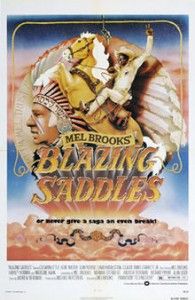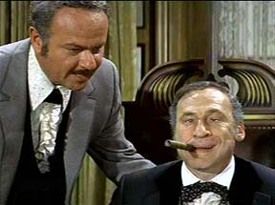‘Blazing Trains’ HSR plan resembles comedy Western
Jan. 7, 2013
By Katy Grimes
SACRAMENTO — In 1974 Mel Brooks produced a classic comedy about the construction of the railroad into the West. With California Gov. Jerry Brown and Democratic politicians pushing forward to build a high-speed rail system, the truth, once again, proves stranger than fiction. The sub-headlines in this article are all quotations from the comedy, “Blazing Saddles.”
“Maybe I could turn this thing into my advantage.”
After rail workers hit quicksand in Blazing Saddles, the route has to be changed right through the frontier town of Rock Ridge.
The conniving state attorney general wants to buy the land along the new railroad route cheaply by driving out the townspeople. “Unfortunately there is one thing standing between me and that property: the rightful owners,” says Hedley Lamarr, played by Harvey Korman.
Lamarr orders gangs of thugs, bad guys, murderers and rustlers to scare the townspeople into abandoning Rock Ridge. “Men! You are about to embark on a great crusade … to stamp out run-away decency in the West,” Lamar says.
“Holy underwear! Sheriff murdered! Innocent women and children blown to bits!” responds Gov. William J. Le Petomane, played by the film’s director, Mel Brooks, when he finds out what’s going on. “We have to protect our phony baloney jobs here, gentlemen! We must do something about this immediately! Immediately! Immediately! Harrumph! Harrumph! Harrumph!”
The old story line of Blazing Saddles closely parallels what is currently happening in California with High-Speed Rail. But even Mel Brooks couldn’t have written this ridiculous modern-day script.
“I didn’t get a ‘harrumph’ out of that guy!”
The California Legislature passed a bill in July which gave the California High-Speed Rail Authority the spending power over $8 billion for the next five years, but with no legislative oversight. Call it “Blazing Trains.”
Gov. Jerry Brown held carefully staged signing ceremonies in Los Angeles and San Francisco, where he inked SB1029 in the midst of cheering union members, construction workers and state and local politicians.
But the governor snubbed the Central Valley, where the initial 130 miles of non-electrified track will actually be installed, despite campaigning on claims that the Central Valley will be the beneficiary of numerous economic benefits and hundreds of jobs.
With a minimum price tag of at least $68 billion, coupled with a total state deficit of more than $600 billion, and the fact that California does not need a high-speed rail system, the state can ill-afford to build a new rail system. But the staggering deficit and lack of public interest hasn’t stopped the governor.
The bill authorized $5.8 billion to start construction of only one unelectric rail line in the Central Valley, and includes $2.6 billion in state rail bond funds, along with $3.2 billion in federal funds.
But California will have to borrow every dime of the money to build the high-speed boondoggle.
“It’s good to be the Gov.”
“What this is all about is investing in the future,” Brown said after signing the bill. “I know there are some fearful men — I call them declinists — who want to put their head in a hole and hope reality changes. I don’t see it that way. This is a time to invest, to create thousands of jobs.”
“I’d say you’ve had enough.”
According to Proposition 1A, the ballot measure passed in 2008 creating High-Speed Rail, “The high-speed train system shall be planned and constructed in a manner that minimizes urban sprawl and impacts on the natural environment.” But the impact of the rail system may actually create suburban communities around train stations far away from urban and high-employment areas.
The train system will dissect both urban and rural communities, and is a violation of the “natural environment.” The trains will travel through densely populated cities, but also through sensitive agricultural and natural areas in the state.
* The California High-Speed Rail Authority must have all of the the funding ahead of time, before any construction starts on a new segment.
* The high-speed train system is supposed to operate entirely on its own and in the black. There are supposed to be no government subsidies. The plan relies heavily on a projection of 100 million users by 2030, an absurd notion that was created with manipulated data.
* “Stations shall be located in areas with good access to local mass transit or other modes of transportation,” the law reads. Unless there are extensive connecting rail systems already in place in the high-speed rail destinations, commuters will not have the necessary train and bus systems to transfer to with the existing plan.
“Mongo go where choo choo go.”
After Brown signed the high-speed rail bill, many in the state said that he may have sealed California’s fate as the Greece of the nation. A June 2012 poll, conducted by USC Dornsife and the Los Angeles Times, found that voters would oppose the plan if given another chance to vote on it.
Despite the poll, the editorial board of the Sacramento Bee recently opined quite the opposite sentiment.
“No place in California stands to reap the rewards of high-speed rail more than the San Joaquin Valley,” the Bee wrote in December.
The editorial board outlined all of the support for the rail system, ignoring that the supporters came almost exclusively from the government sector. “From Fresno Mayor Ashley Swearengin to officials at California State University, Bakerfield — which is launching a ‘High-Speed Train Information and Simulation Center’ to build capability for innovation — far-thinking people realize the value of high-speed rail,” the Bee wrote.
The other “far-thinking people” are the contractors who have been awarded large union contracts to build the Central Valley rail line.
“As the site of the state’s only major north-south highways (Interstate 5 and Highway 99), some of the worst air quality in the nation, poverty and rapid loss of farmland to sprawling urban development, high-speed rail can improve quality of life in a number of ways.”
“Why would Hedley Lamarr care about where the choo-choo go?”
Assemblywoman Diane Harkey, R-Dana Point, has championed the cause against building High-Speed Rail with facts, data and and the overwhelming body of evidence that California’s economy cannot build or maintain the system.
Harkey noted in July that the governor did not hold his signing ceremony in the Central Valley. “Bakersfield, or Kern County, is next on the radar screen for a variety of routes involving 60- to 80-foot high viaducts, and destruction of historic buildings, business centers and neighborhoods,” Harkey said. “Kern County’s northern neighbor, Kings County, currently suing the state, was scheduled first for demolition. Changing ground zero to Fresno-north brought the Merced and Madera county farm bureaus into litigation, as well as other affected parties. The deep-rooted agricultural and oil-producing way of life in the Central Valley feeds and powers the state and nation.”
Harkey asked: “If creating the backbone for High-Speed Rail is such a boon to the people that live there, why are they suing?”
Residents in the Central Valley don’t want HSR. They want their farmland, and they want the water spigot turned back on.
California boasts the lowest credit rating in the nation. The state has to borrow billions of dollars every year to meet short-term cash flow needs. And California’s real debt is not the $16 billion that Brown and state Democrats crow about. In August, California’s real debt was recorded at $617 billion.
The state’s crime rate is up because of Brown’s realignment “catch and release” plan for state prisoners. California ranks down at the bottom of the states with Mississippi in public education achievement and test scores, but ironically supports one-third of the nation’s welfare recipients. Unemployment in California is way above the national average. Municipal bankruptcies are snowballing.
“But we continue to borrow to fund needless projects and ‘realign’ grabbing funds from local governments,” Harkey said. “The result yields more centralized state control and a growing state bureaucracy.”
Related Articles
Study lobbies for more spending
JUNE 28, 2010 By LAURA SUCHESKI A report released Thursday from the left-leaning California Budget Project spells bad news for
Brown meanders, but sticks to taxes
JUNE 2, 2011 By STEVEN GREENHUT Gov. Jerry Brown’s talk to the California State Association of Counties was more meandering
Green-job future a fraud
JUNE 1, 2010 By JOHN SEILER California’s unemployment rate remains stubbornly high, at 12.6 percent. That’s 2.7 percentage points




